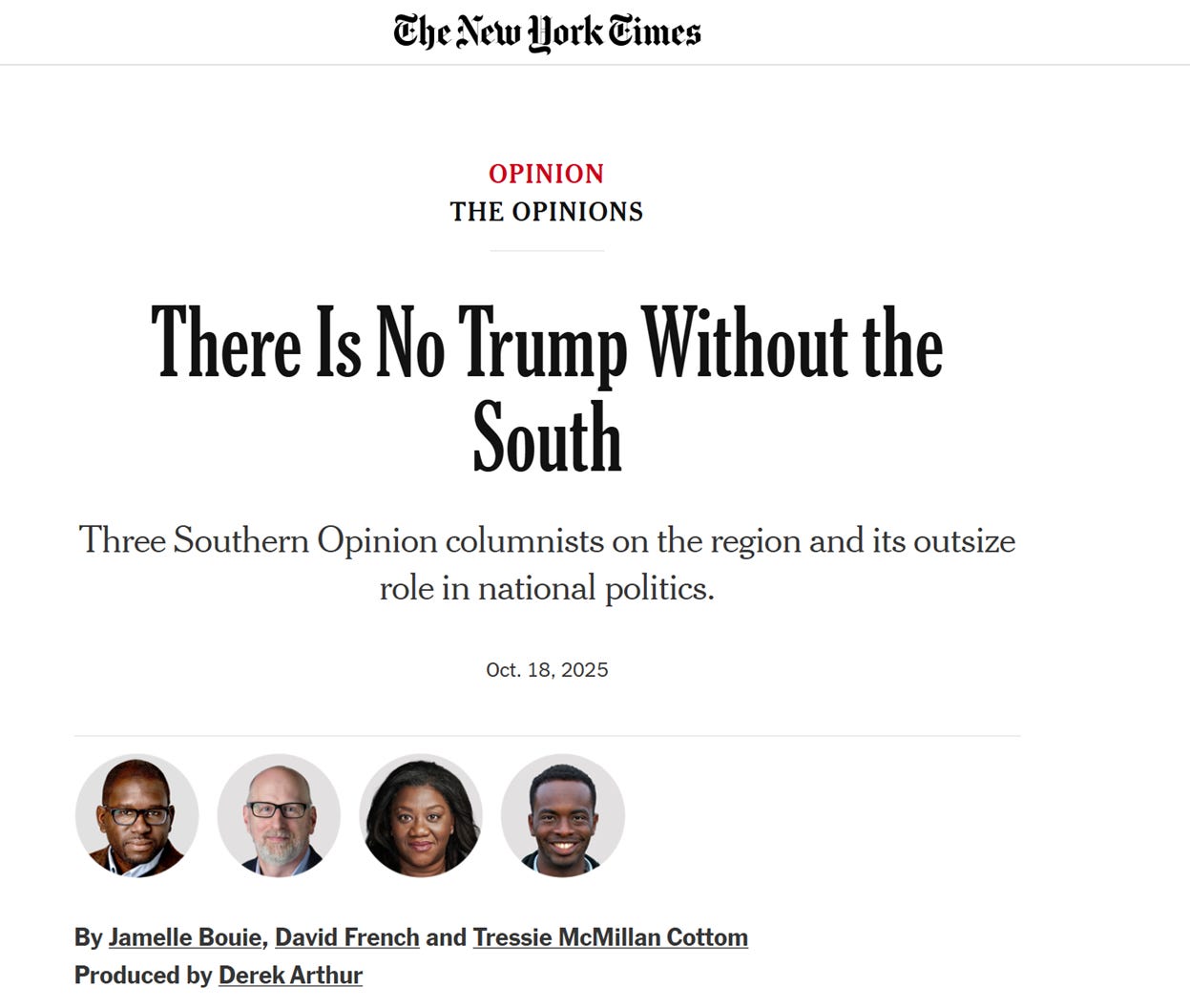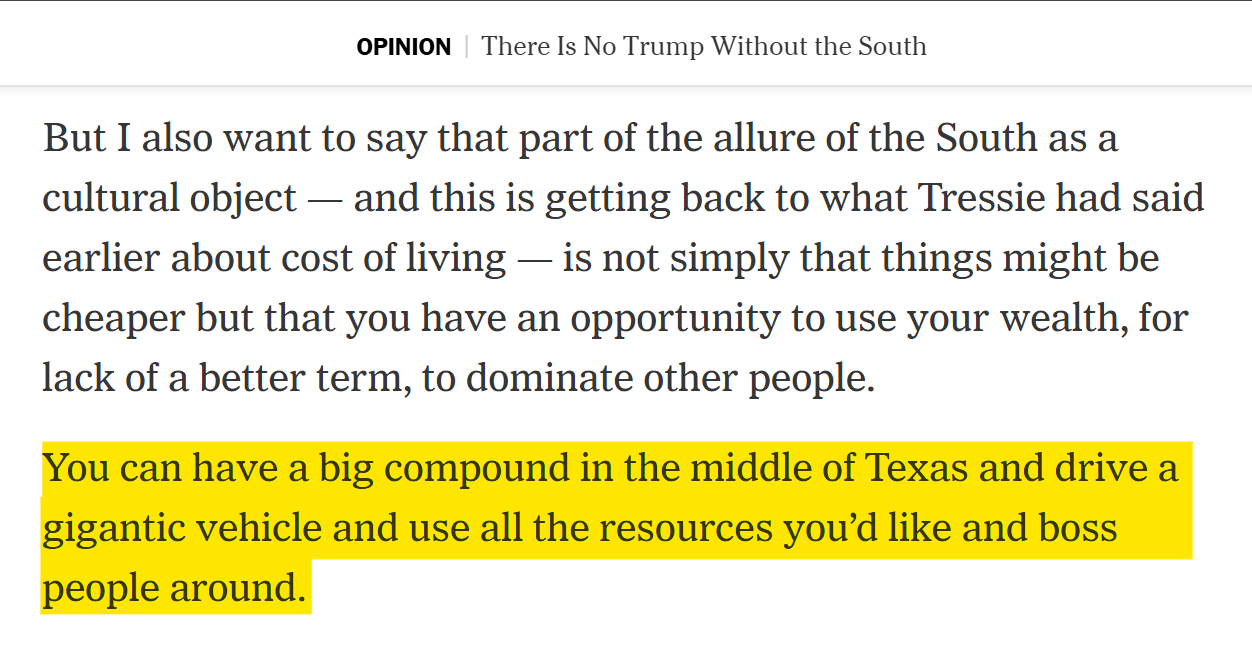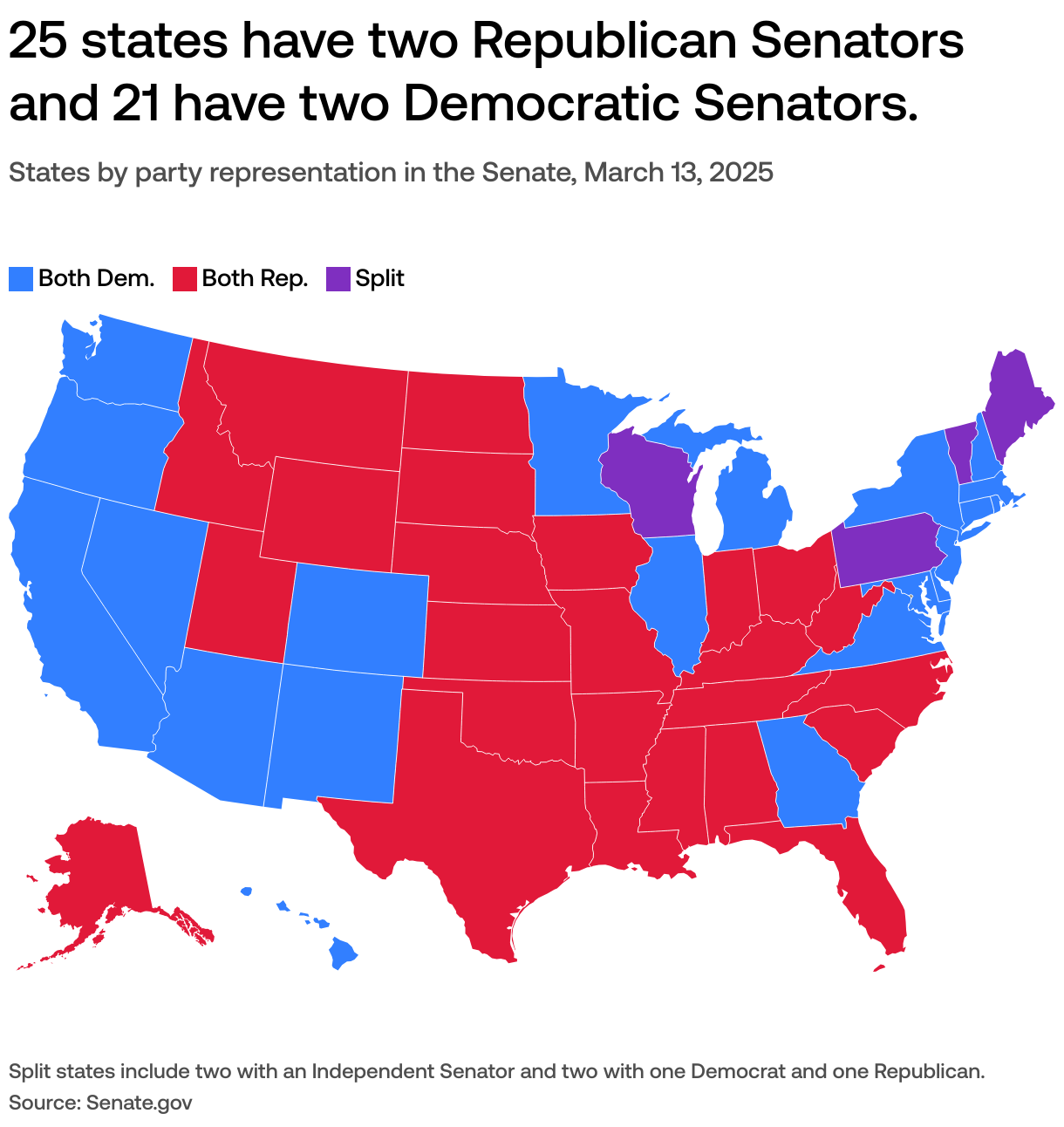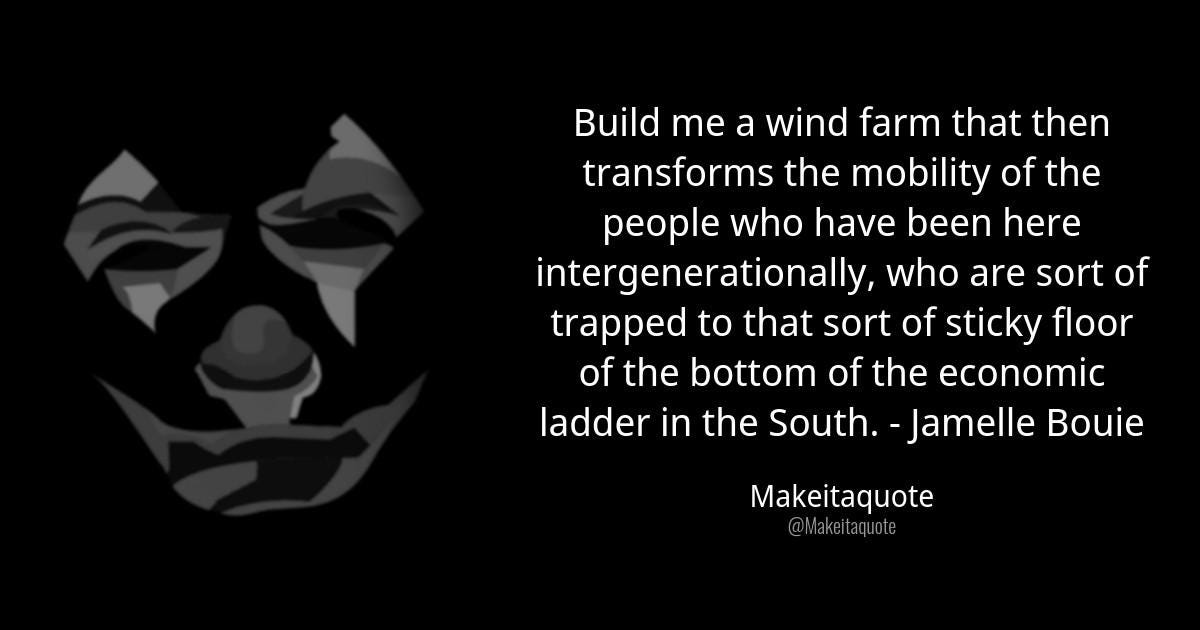The South, California, and Cultural Equality
Cultural Sophist Rhetoric as political kabuki theater
“We all get a little Southern when this nation is going fascist.”
-Tressie McMillan Cottom
Recently, New York Times columnists David French, Jamelle Bouie, and Tressie Cottom sat down and discussed Donald Trump and the American South. This might be shocking to some, but it was not all good news.
This conversation was titled, There Is No Trump Without the South.
The conversation itself was nothing all that special with the standard fare of claiming Trump is the resurrection of Huey Long, George Wallace, and possibly Jefferson Davis. The writers made sure to lament how regrettable the existence of the South is, and that its very presence in America dares to influence national politics.1
Hearing tired tropes about the South, even from a group of New York Times writers proclaiming their Southerness at the start of the show was not surprising. Throughout the discussion, a vision is painted of modern-day Plantations dotting the South with aristocrats lounging on the veranda, and quietly sipping iced tea as they look out at the day’s activities with smug satisfaction.2
The usual cringe I’ve come to expect from the NYT was almost immediate, as this exchange between French and Cottom3 displayed:
French: “Tressie, what’s your Southern background?”
Cottom: “I could start by saying, “Well, I’m Black.”
Okay… moving on.
Tressie Cottom is later asked what advice she would give to the Democratic party to have electoral success in the South.
She states:
“I think one of the things that happened with the Democratic Party in the South — and I’m just going to say this plainly as someone who’s seen it — the Democratic Party just has to reckon with the fact that if it wants to matter politically, it has to negotiate with Black political power. And if it wants to be viable and competitive with the Republican Party — that is, figuring out a message of economic populism that cuts across some race differences — it had better figure out how to invest in and grow the Black political infrastructure.
One of the challenges, I think, that the Democratic Party is facing in this moment is that the everyday life of Black political life in the South has changed. You see this decline of what we call chocolate cities — a place like Atlanta or D.C. seeing these massive demographic changes, which does weaken the Black political structure of the South, which the D.N.C. needs.”
Endorsing tactics of direct racial appeals in a conversation centered around accusing Trump of the same is peak irony. Cottom indirectly mentioning that demographics is destiny in the political realm was not missed.
There were funnier moments in the discussion, especially when Jamelle Bouie likened the increasing numbers of people moving to the South from Blue states, Texas in particular, only doing so for the chance to live out some warped “Yellowstone” fantasy, LARPing as the fictional patriarch John Dutton while they bark orders to random folks on the street — and maybe taking the Amazon delivery guy to the Train Station if packages are late.4
The discussion then pivoted to the differences between regions, with this statement describing why people move to blue-coded cities and states like California.
Bouie says:
“Because what a place like California is offering, the trade-off is it’s going to be more expensive to live there. Unless you are in the highest echelon of income earners, you’re not going to be able to hire someone to look after your house for dirt cheap, right? You won’t be able to exploit someone so easily.
But you are going to live in this multicultural, cosmopolitan place where people are going to exist, at least culturally, on some plane of equality. And if you like that kind of life and experience, that’s what you’re in L.A. for, that’s what you’re in New York for, that’s what you’re in Chicago for and all the places that are their own places but offer a smaller or more manageable versions of that thing.” [Bold added for emphasis]
California is a bastion for Cultural Equality? What does that actually mean in practice? Online searches kept referring to Cultural Equality as Cultural Equity,5 but the best definition is from the 𝕏 AI Grok, who stated:
“Cultural equality refers to the principle that all cultural groups, regardless of their background, ethnicity, or traditions, should have equal recognition, respect, and opportunities within a society. It emphasizes the fair treatment of diverse cultural identities, ensuring no group is marginalized or privileged over others in social, political, or economic contexts. This concept promotes inclusivity, mutual understanding, and the equitable sharing of resources and representation while acknowledging and valuing cultural differences.”
Bouie, a Virginia-based writer who has worked for the Daily Beast, Slate, and The New York Times, has never lived in California. Researching further, I found a few public events in academia he has attended in the state and some nice pictures of the beach he took while here.6 To speak on authority for a state of this size after such limited exposure is on-brand.
His technique of shallow sophist rhetoric is familiar territory, as I have written about in the past.
Generalizations and Realities
This idea of California as some exemplar of equality on a cultural level is as comical (and false) as the generalizations made about the South. Yet both have their purposes for the Progressive Left. The polarizing language and attitudes for the South help to reinforce the “otherness” of the region as it is (with some exceptions) an almost solid red Republican stronghold. Democrat operatives like Bouie, French and Cottom maybe publicly denounce the Schmittian friend/enemy distinctions, but they fully understand the concept and put it into practice, however subtly.
Blue state = Friends
Red state = Enemy
The cultural balkanization and enclaves across California are readily apparent to anyone who lives here. The slogan of “60 nations and 200 languages” is even used by the state’s current healthcare drive by Covered California. 10 million residents, or 25% of the 40 million total are foreign born. To ignore the frictions this creates is willful ignorance at this point.
Yet this idea of equality, any kind of equality is something of a farce, and the political kabuki theater of pretending that it exists is beginning to wear thin. California leads the nation in income inequality, poor health outcomes, and homelessness. In an attempt to mask these glaring deficiencies, a constant propaganda message of kumbaya cosmopolitanism and the idea it being a multicultural utopia is broadcast from sources in media like The New York Times. It tells whoever is susceptible that Good People live in places like California. Virtuous and Caring People. Simply put, the equality mantra is a constant political campaign for a friendly blue state.
Obviously, I am not saying there are not good people in the state that I have lived in for nearly 20 years.7 Nor is it the hellscape that Fox News portrays. But, as a native of the South, I too had clichéd notions of what California was going to be like through the power of media and television before coming here. The day-to-day experiences quickly put those false notions out of my mind. There isn’t a secure economic middle ground available for many in the former “Golden” state.
For the Progressive Left to paper over the problems and issues here is not fair to Californians. Neither is it fair to Southerners to try and use illusions of superiority as a cudgel against them and the region.
- Arthur
One more Bouie quote.
I’m embellishing — but not by much.
Modern car factories and heavy industries are essentially the stand-in for Plantations in the discussion regarding worker rights and exploitation.
Yes, the South has the most Black people in the US percentage-wise, but it’s still odd to see regional identification by race. Not all Blacks are by de facto from the South.
That’s not even my analogy. Tressie Cottom declares, “It’s the “Yellowstone”-ification of the country.”
The subtle attempts over the last 10-15 years to conflate Equality with Equity as one and the same have not gone unnoticed by this writer.
A few speaking appearances in the gilded halls of academia with a room at the Hilton and a rental car receipt do not make one knowledgeable of an entire state.
This is one of America’s most beautiful states. The natural landscape and features still leave me in awe at times.






I live around extremely “progressive” people, and I hear these kinds of condescensions (and worse) about southerners all the time. If I’m being honest, I held those types of attitudes at one point in my life, but now I find it viscerally disgusting. Good job highlighting this thanks for writing.
Reading Bouie at Slate in my mid twenties turned me off the left. He’s retarded. Also I’m pretty sure if you look for highest functioning lowest crime black communities you will find them in the South. Parts of Atlanta, Houston, etc.